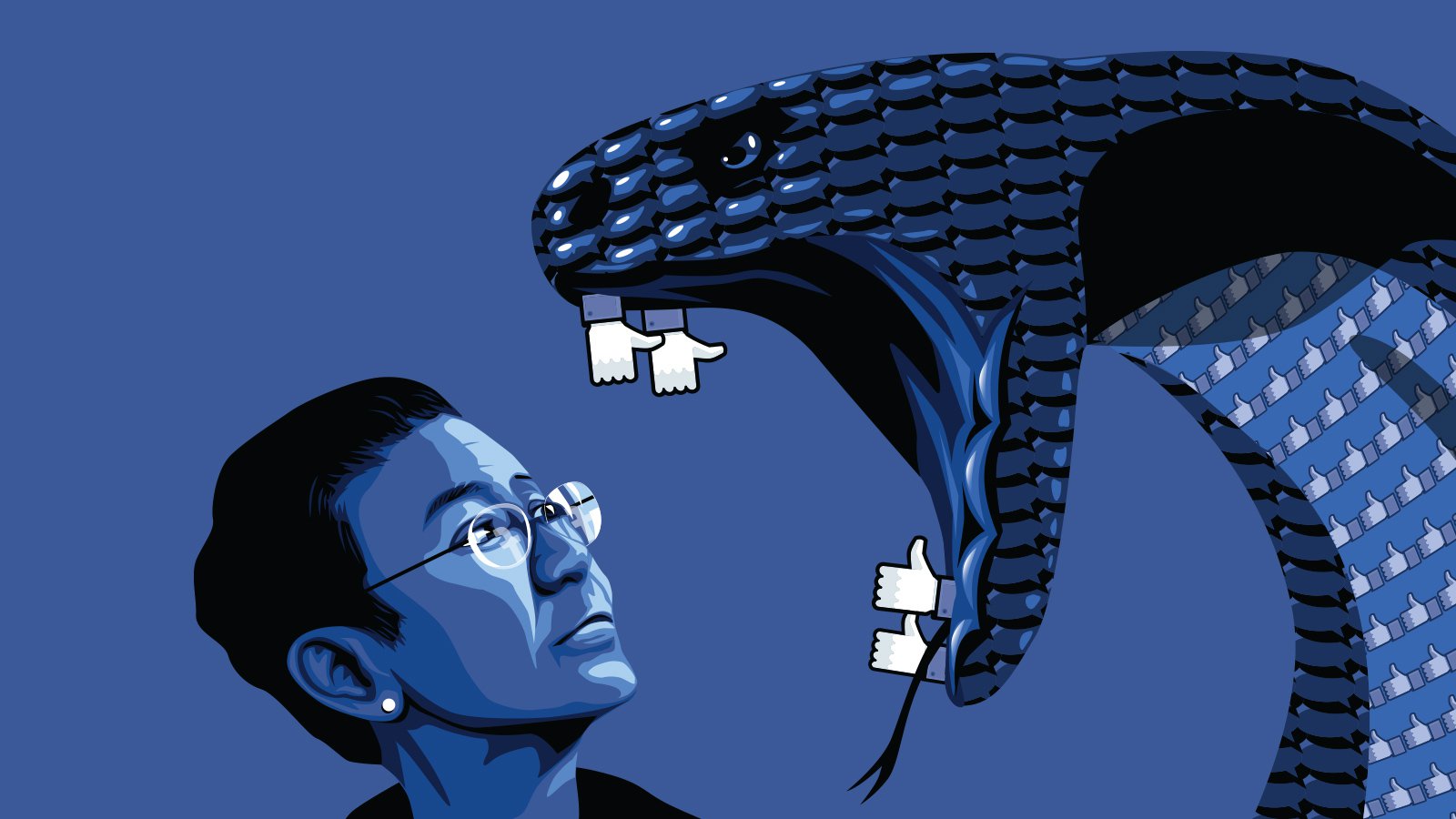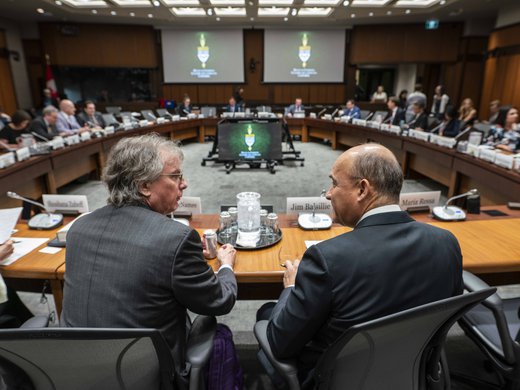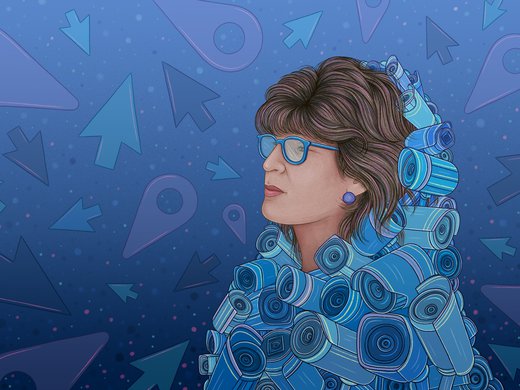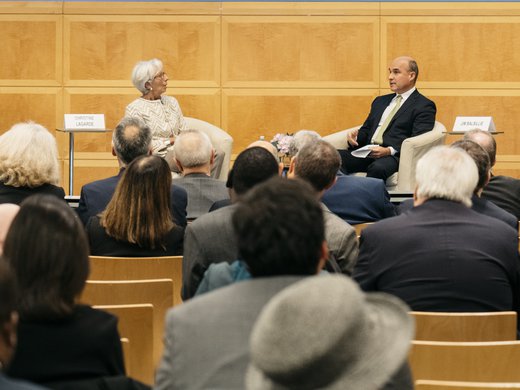Maria Ressa, the award-winning reporter and co-founder of Philippine news site Rappler, ended last year on a high note. In December, she was one of several journalists honoured by Time as “Person of the Year.” Then, as 2018 came to a close, she gathered with a group of colleagues in New York City’s Times Square to launch the annual ball drop. Their New Year’s Eve invitation was meant to recognize the importance of a free press and free speech — something Ressa has been championing for decades.
But early in 2019, over a period of five weeks between February and March, she was arrested twice, first on a charge of cyber libel and next for alleged tax evasion — widely considered to be retribution for Rappler’s critical reporting of Philippine President Rodrigo Duterte and his administration’s drug war, which UN experts say has caused a “staggering” amount of deaths.
“There are parts of the Philippines that think I’m a criminal, because the government said so,” she told the Centre for International Governance Innovation in a recent phone interview from Manila. “And I’ve done nothing but what I do as a journalist — I just refuse to be bullied. I refuse to be intimidated.”
Besides her investigative reporting on authoritarian leaders, Ressa has also been vocal about what she sees as another, possibly even more dire threat to democracy: social media’s ability to spread disinformation, spew hatred and polarize societies.
“If you don’t have facts, you can’t have truth. If you don’t have truth, you don’t have trust. If you don’t have these two things, you don’t have democracy,” she said. “You have no ability to have any kind of civic engagement — your society cannot hold power to account, and the voice with the largest megaphone wins, which in our country is President Duterte. And that’s exactly what played out.”
Below is an edited version of Ressa’s conversation with CIGI senior editor Catherine Tsalikis, in which Ressa discussed the dark side of digital technology, why the Global South feels its negative effects more profoundly and how to restore democracy in the age of disinformation.
With the founding of Rappler in 2012, what were your hopes around the power of digital technologies to transform society?
The second book I wrote, From Bin Laden to Facebook, looked at how the virulent ideology of terrorism moved from the physical world to the virtual world. Looking at all this made me realize, if you have one person in the physical world, when you bump it up to the virtual world, you can convert that one into four — that’s the network effect, the exponential power [of social media].
Then I thought, Why can’t we use this as a force for good? I was tired of waiting for the top-down strengthening of institutions of governance. I thought that with this kind of vibrant society we could help build institutions…and we could use journalism as food to build communities of action. That was the idea behind Rappler, [which we] successfully grew from 2012 to 2016.
How did the 2016 Philippine presidential election expose the dark side of digital media companies — in particular, Facebook, one of Rappler’s partners — to you and your team?
The Duterte campaign was really the first time a Filipino politician understood the potential of social media. Not surprisingly to us, he won. [As] in many countries around the world, the social media campaign groups and accounts that were used to help Duterte win the presidency were then weaponized and used as the place where disinformation went viral. In July 2016, when the drug war began, we saw the hate beginning. The first targets were anyone who questioned the killings in the drug war — they were normal people, pounded to silence. The second targets were journalists, news groups third, and then fourth were opposition politicians.
Simultaneously to that, we began to gather data on our own Facebook page. We discovered these fake accounts that were working together — this is when we got a sense of the methodology. We found one Facebook account that was really trolling all the news groups — that was our ground zero. Then, over three months, we manually counted accounts that they influenced. [We eventually identified] 26 fake accounts that could influence up to three million others.
That’s when the scale — in [Joseph] Conrad’s words, “the horror!” — hit me. In August 2016, I went to Facebook with the data that we had, and I said, This is really alarming, look at these numbers. The people I met with were shocked but didn’t know what to do. At the end of the meeting, I said, You have to do something, because [if not] Trump could win. And we all laughed because that didn’t seem possible then…and then in November, he won.
With Instant Articles, Facebook became the largest distributor of news globally, but it left behind the responsibility of the gatekeeping role. The most important part of what we do as journalists is determining facts from fiction. [Facebook] threw news into the same algorithms that were designed to appeal to the worst of human nature, the kinds of things we’d sometimes even hide from ourselves. These algorithms were designed to keep you on-site for as long as possible. You’ve seen all of these studies already — for YouTube, it pushes you further to radicalization; for Facebook, lies laced with anger and hate spread faster than facts.
A lie told a million times becomes a fact; that’s the reality of social media, and that’s what authoritarian-style rulers around the world are taking advantage of.
What’s alarming to me in the Philippines is that traditional news groups — because we refuse to collaborate with each other, because we grew up in competition with each other — have been pushed to the sidelines. [This] all works together to weaken democracy. A lie told a million times becomes a fact; that’s the reality of social media, and that’s what authoritarian-style rulers around the world are taking advantage of.
In Rappler’s case, it was the simplification of several words: instead of “journalist,” you substitute “criminal,” you throw in “foreign-owned,” “foreign-influenced” — very Putin-esque.
And then you say “they’re out to tear down our government,” [and] the paranoia and the fear [is] repeated a million times on social media. State proxies then pick it up, some of the content creators on social media then shift [the message] to traditional media — in the Philippines, a newspaper called The Manila Times has been the venue where that has happened.
A year later, after the attacks receded on social media, then they came top-down. President Duterte, in his July 2017 state of the nation address, said that Rappler is fully owned by Americans. I automatically tweeted, “Mr. President, that’s not true”…but in a chaotic information ecosystem like this, what chance do we have?
You have cited the Philippines as an example of how quickly democracy can crumble. How is the Global South affected differently by disinformation, etc., than countries in the West?
Look, these are emerging democracies — we don’t have institutions, or if we do, they’re extremely weak, which means we’re far more vulnerable. That is part of the reason disinformation or information warfare in our part of the world leads to immediate violence. When Mark Zuckerberg was in front of Congress and said that it would take five years to be able to solve this, I was crazy, because every day that it’s not addressed, every day of delay means someone dies. I could go to prison because of this.
The West now knows that online hate and violence translates to real-world violence. But what you guys feel there is a fraction of the reality we live in [pauses]…look, I’m getting emotional, I’m so upset. So yes, we bear the brunt of the experiments. In the short term, the only people who can fix this for us are the social media technology platforms. Just like a news group can decide to be the gatekeeper [of] our standards and ethics — those are all within the power of Facebook, YouTube, Twitter.
That’s part of the reason I spend a lot of time partnering with them, because [Rappler] still live[s] on social media, we only exist on the internet. I say please, please, you have to do something about this, because this is my life on the line. I’m not speaking academically — I’m staking a lot of what I’ve built in my life on this.
It’s also because I think there is a lot at risk for the Philippines right now. Facebook broke democracy in many countries around the world, including in mine. We’re forever changed because of the decisions made in Silicon Valley. That’s part of the reason it needs to take responsibility.
You’ve made the point that it is largely American companies that have brought us to this moment, so what would you like to see them do to remedy the situation? Or is this a job for the international community as a whole — you’ve mentioned the idea of a “global Interpol”?
After humanity unleashed its evilness on itself in World War II, the world came together and came out with agreements to prevent the worst of human nature from attacking societies — Bretton Woods, NATO, the Universal Declaration of Human Rights. I think this is one of those moments. We’ve relied only on the tech companies [so far] and while I am working with some really good people inside, I also know that the incentives of business push them [in] the opposite direction. This is the time for old power and new power to come together, and I don’t think it’s as simple as legislation.
I think we start with, What are the values and principles that govern the internet? After you set that, then you have these guidelines, then you create the institutions that will make sure that violating these guidelines does not happen with impunity. And that’s where I was thinking, How do we create an Interpol to look after criminals who jump from country to country? Make the data of known information operations transparent so people cannot get away with manipulating the public sphere with impunity. I think that’s one solution that needs to happen, and slowly there are different groups that are coming together. It is moving at a glacial pace, which is why I continue to work with the individual tech companies.
After humanity unleashed its evilness on itself in World War II, the world came out with agreements to prevent the worst of human nature from attacking societies — Bretton Woods, NATO, the Universal Declaration of Human Rights. I think this is one of those moments.
And then the other thing that we’re trying to do is to get journalists and news groups together to collaborate. In January, we rang in the new year at Times Square together. In order to survive, in order to protect the facts, news groups are going to have to start working together, because the networks of disinformation are extremely coordinated, and they are wearing us down.
[As for social media], what they need to do is to figure out how they’re going to stem the poison that they’ve allowed into the body politic. Actually, I like thinking about it like a virus — so if democracy is the body, they’ve allowed a virus in, and it’s replicating quickly, and it is killing our body politic.
What is the role of political leaders in this fight?
As after 9/11, which forced the world’s militaries and law enforcement to change from the Cold War paradigm, we are in a new world, and the biggest problem that we have here is leadership.
More than at any other time, political leaders have to define the values they stand for. And they have to come together and let go of the rivalries and the bitterness and the alliances of the past. I think that our opposition politicians [in the Philippines] could’ve done a better job if they understood both the role of democracy and if they stopped looking at it as a game of politics. I see the same with the Democratic Party of the United States; they’re going to self-implode before they even get to elections.
I think our world is looking for leaders people can believe in. It isn’t about tearing something down, which is what the disinformation networks focus on. When we had our Rappler Mood Meter, [we found] anger spread fastest, but the emotion that spread second-fastest was inspiration. Who can inspire? What are the values that inspire you? In the Philippines, I’m being forced to take positions on things I’m uncomfortable as a journalist doing, because I’m not a politician. So, I look for leadership in our political leaders. That is what our democracies demand in the age of disinformation.



